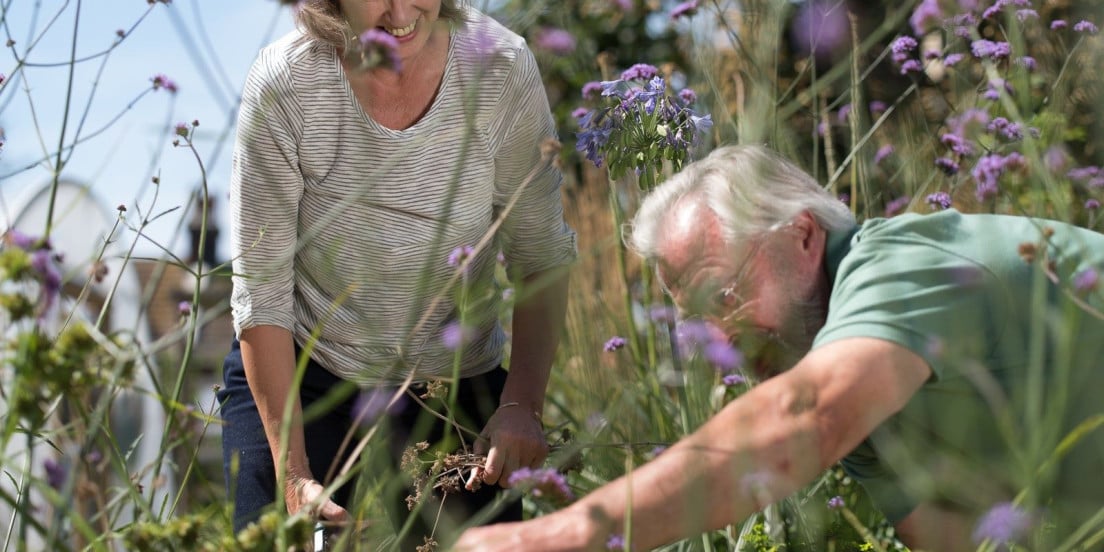How Gardening Enhances Your Wellbeing
01 October 2024
Posted under: Hobbies & interests

Gardening has long been cherished as a pastime, but it offers much more than the satisfaction of seeing your wildlife grow; it can significantly enhance your wellbeing, providing physical, mental and emotional benefits. At some of our Pegasus Homes later living communities, we take pride in the landscaped gardens our residents can take the time out to enjoy in the warmer months; whether that be with family and friends or maintaining an allotment like at our Highfields, West Byfleet community.
Physical Health Benefits
Gardening is a form of low-impact exercise that involves a variety of physical activities such as digging, planting, weeding and watering. These activities can improve cardiovascular health by increasing your heart rate, which enhances cardiovascular fitness and reduces the risk of heart disease. Additionally, gardening tasks like digging and lifting pots strengthen muscles, particularly in the arms, legs and back. The movements required in gardening help to enhance flexibility and balance, reducing the risk of falls and injuries.
Spending time outdoors in your garden exposes you to fresh air and sunlight, which can have numerous health benefits. Sunlight exposure helps your body produce vitamin D, essential for bone health and immune function. Breathing in fresh air can enhance lung capacity and respiratory health. Regular exposure to natural elements can strengthen your immune system, making you less susceptible to illnesses. The combination of physical activity, fresh air and sunlight makes gardening a holistic approach to physical health.
Mental Health Benefits
The act of nurturing plants and being in nature can elevate your mood and decrease feelings of anxiety and depression, lowering cortisol. Furthermore, watching your plants grow and flourish gives a sense of achievement, boosting self-esteem and satisfaction. This therapeutic interaction with nature can help to provide a much needed respite from the stresses of daily life.
Gardening requires planning, problem-solving and creativity, all of which can sharpen your mental abilities. Activities such as designing a garden layout, choosing plants and caring for them help to stimulate the brain, improving cognitive function and keeping you mentally active. For older adults, gardening can be particularly beneficial in maintaining cognitive health and delaying the onset of dementia and other cognitive disorders. The repetitive and meditative nature of gardening can enhance your ability to focus and concentrate, making it an excellent activity for mental health.
Emotional and Social Benefits
Gardening has therapeutic effects that can enhance emotional health. The connection with nature and the act of caring for living things promote mindfulness, encouraging you to be present in the moment. This mindfulness can reduce anxiety and promote emotional stability. Designing and maintaining a garden allows for creative expression, which can be a powerful outlet for emotions and the physical activity, fresh air and sense of purpose provided by gardening can alleviate symptoms of depression and boost overall emotional wellbeing.
Gardening can also be a social activity, fostering connections with others and enhancing your social well-being. Whether gardening with family members, friends or as part of a community garden, like our residents at Belle Vue, Hampstead, who have bonded over the community's herb garden - it creates opportunities to meet new people in all stages of their lives.
Sharing gardening experiences with others can build friendships and reduce feelings of loneliness; community gardens in particular provide a space for people to come together, share resources and work towards common goals.
Environmental Benefits and Personal Fulfillment
Gardening fosters a deep connection with the natural world, promoting environmental stewardship and a greater appreciation for nature. This connection increases environmental awareness as you learn about the needs of plants and ecosystems which in turn helps lead to more sustainable living practices. Growing your own food, for example, can reduce reliance on industrial agriculture, decreasing your carbon footprint and promoting sustainability.
Gardening is a continuous learning experience that can provide a sense of purpose and fulfillment. As you gain knowledge and skills, you can experience personal growth and a sense of accomplishment. Learning about plant care, soil health and pest management can broaden your knowledge and expertise. The journey of gardening, from planting seeds to harvesting produce, offers a rewarding and joyful experience. The process of overcoming challenges and achieving gardening goals can lead to personal growth, making gardening a fulfilling and enriching activity.
At some of our Pegasus Homes communities, such as Moor’s Nook, Woking, Steepleton Tetbury and Leyton Road, Harpenden, our apartments come with either terraces, balconies and shared garden spaces, which our green-fingered residents take pride in making their own.